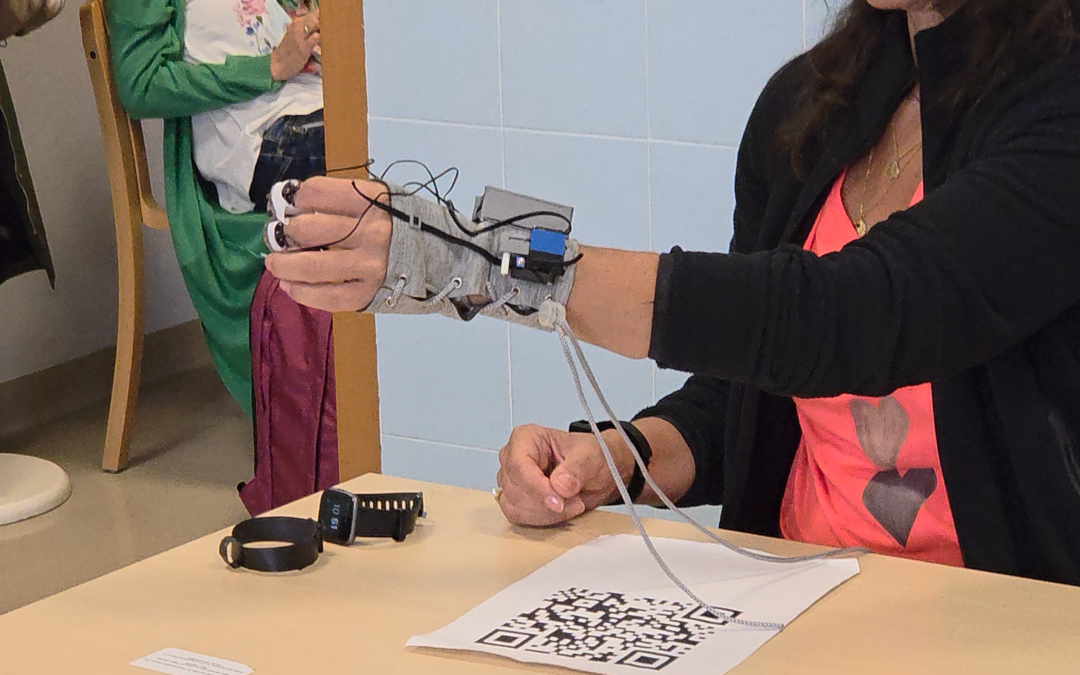After years of preparation and development towards the practical application of our systems and platform, it was finally time to put everything to the test in an official pilot setting. Together with partners from the SUN Consortium and the local hosts ASL-NO, we successfully carried out Pilot 1 of the SUN.XR Project at Versilia Hospital in Tuscany, Italy.
The pilot focused on testing innovative Extended Reality (XR) solutions for remote physical rehabilitation in breast cancer survivors affected by lymphoedema. Using state-of-the-art XR technology and a haptic feedback glove, participants experienced new ways of performing therapeutic exercises in a virtually augmented environment designed to engage targeted muscle groups and structures, as well as to enhance recovery, motivation, and overall well-being.
Two participants from Germany, accompanied by Outdoor Against Cancer (OAC), had the opportunity to take part in this exciting pilot study and shared their heartfelt impressions after completing the programme:
Yvonne Specht:
“Once again, heartfelt thanks for the wonderful and easygoing days in and around Pisa, for your great helpfulness, your quick and conscientious commitment. Everything fit perfectly at all times, it was simply flawless. I truly thank you from the bottom of my heart. I found the project very exciting. It’s fascinating to see what technology is capable of nowadays. Being even a small part of it was a truly valuable experience for me.
The exercises were demanding, I even had sore muscles in all my hand and finger joints, but as we know, muscle soreness is a good sign! And the 1 cm reduction in arm circumference speaks for itself. The team, the assessments, and the overall performance were all excellent, the time just flew by. All in all, it was a very valuable and positive experience that gave me more joy in life and renewed hope.
My heartfelt thanks also go to Petra and the entire OAC team.”
Carmen Lopez:
“My experience with the SUN project was very positive and helpful.
All the doctors, physiotherapists, engineers, and of course Devin were always friendly, caring, and genuinely attentive to our well-being. The exercises helped me strengthen and at the same time relax my chest muscles. Feeling such quick improvement after just four days really impressed me. I also learned to be more mindful in my daily life when using my left arm.
Everything was very well organised, and we even had the chance to enjoy beautiful Italy.
Overall, it was a wonderful experience that nourished me on every level. Many thanks again to OAC and the SUN Consortium for this gift!”
OAC and the SUN Consortium are thrilled with the positive outcomes and feedback from participants, which confirm the promising potential of XR technology in clinical rehabilitation, especially in remote settings, where it can ease the burden of travel for those with limited access to healthcare infrastructure in areas far from urban hubs. The aspect of having tasks to complete allows patients to use the affected arm for longer periods and to maintain positions that are beneficial for recovery.
The pilot demonstrated that combining immersive environments with haptic interaction can significantly enhance patient engagement, recovery, and quality of life. Building on the success of Pilot 1, the consortium looks forward to scaling up the approach and exploring new applications of the SUN.XR platform in future studies and healthcare settings. These first encouraging results mark an important milestone toward more human-centred, technology-supported rehabilitation solutions across Europe.

